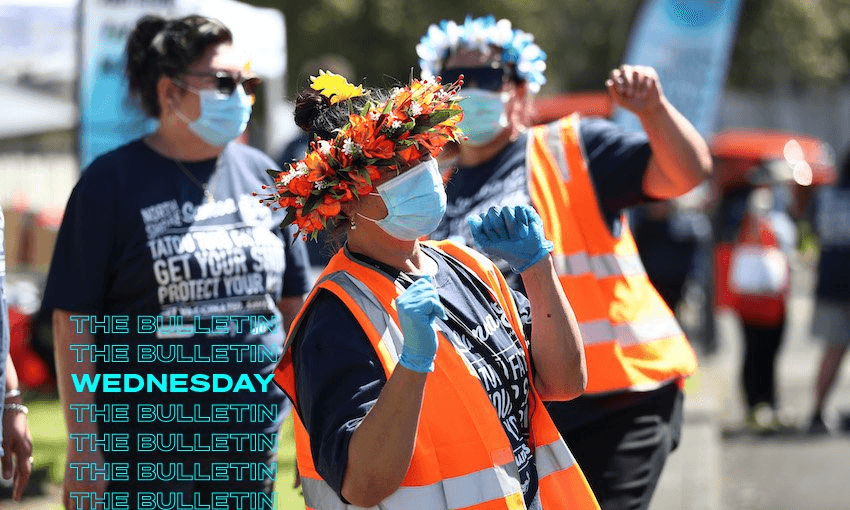What began as Tamati Shepherd-Wipiiti’s brainstorm ended up as the biggest day in the country’s vaccination programme, Justin Giovannetti writes in The Bulletin.
The story behind Super Saturday. Three weeks before the most successful day in the country’s vaccination programme, Tamati Shepherd-Wipiiti was at home, surrounded by post-its, unicorns and scribbled notes. The ministry of health manager was trying to figure out a way to get more jabs into Māori arms. He spoke with The Bulletin about how the big event came together.
“For Māori we have a few things that motivate us. We are fiercely protective of our whanau and our whakapapa. Another thing that’s really motivating is competition, we love to compete,” he said.
“As a country we’d done very well with the over 65s. Over 90% vaccinated in nearly all DHBs. I had to ask myself: If ‘protect your whānau’ works for that demographic, what works for 18 to 40-year-olds? It’s competition, it’s sports and it’s a Māori sense of humour. How do we bring those together nationwide? I suddenly thought, ‘Gee, telethon used to be really cool like that.’ We used to get together as a country, could I take that and create a vaxathon?”
Shepherd-Wipiiti is usually a senior health consultant with PWC, but he’s currently on secondment to the ministry of health. His focus is on increasing equity in the country’s vaccination programme. Armed with an idea, he wrote out a one-page concept, shared it with ministers and others in government, and got rapid feedback. They loved it and were willing to fund it. Others may have had similar ideas, but his name is on the plan that became reality.
The deadline was incredibly tight, with an announcement made to the public on October 6. “Usually you have nine months to stand up a telethon, we had 10 days,” he said. Super Saturday was marked as October 16 on the country’s calendars and circled in red ink.
The need for a strong business response. One of the first people to get a call was Rob Fyfe, former head of Air New Zealand and the government’s main conduit with the country’s business community. “I told him there was no way we could do this alone, we need business. He said business will be receptive to any initiative that’ll help get the country open. We started a call out and just had major support, all the big names came forward,” said Shepherd-Wipiiti.
The day quickly morphed into a public-private venture with over $500,000 in donations from industry, along with offers of facilities and help. From a new airliner serving as a vaccination clinic to free KFC, the day became a focal point for New Zealand business. It was a reflection of the small team that brought it together, only four people who themselves represented a merger of business and government.
“I was really surprised with the level of support from private businesses,” said Shepherd-Wipiiti. “It was like we opened a valve and they threw their weight behind the programme. We couldn’t believe what we got. Wow. It’s been tough times for kiwi business but they wanted to be part of it.”
In the end, vaxathon and Super Saturday was a success. Over 130,000 New Zealanders came out for a party and a jab. It was the single biggest day of the vaccination programme for Māori and offered people a splash of entertainment in the middle of gloom, according to Shepherd-Wipiiti.
“We started with: how can we lift our Māori vaccination numbers? And then we thought, if we can make this work for Māori, we’ll make it work for the country. It was fun for everybody,” he said.
“The thing that was really exciting for us was that the health sector has been under a lot of pressure since Covid happened last year. For a lot of them this was a moment to celebrate. Everyone has had a good injection of fun, the element of competition is still there and we want to harness that in the coming weeks to get the job done.”
While another Super Saturday isn’t likely, there could be bigger regional events next month in a final push to get the country’s vaccine programme across the finish line.
This is part of The Bulletin, The Spinoff’s must-read daily news wrap. To sign up for free, simply enter your email address below


